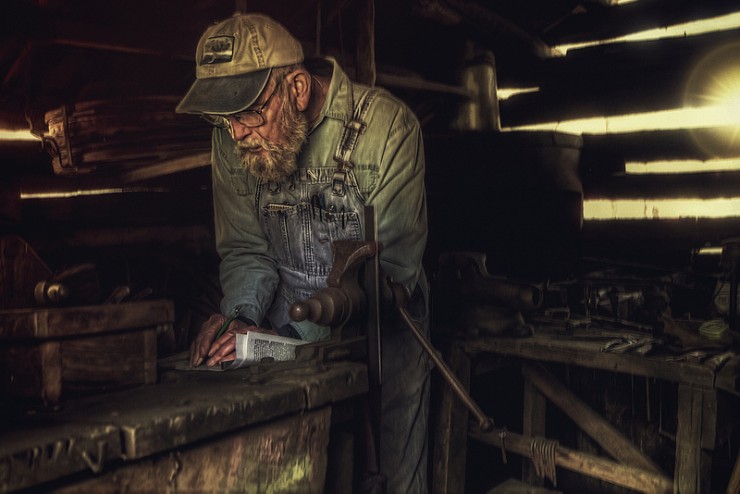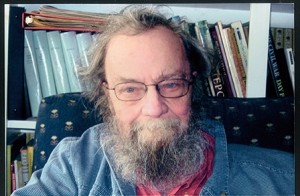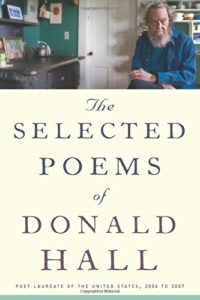Donald Hall, 87, says he can’t write poems any more. But he can still write essays and articles, and he can still select his favorite poems and assemble them into a collection that illustrates a lifetime of poetry.
The collection is entitled, appropriately enough, The Selected Poems of Donald Hall. The poems are drawn from some 16 collections of poetry Hall has published since 1955. His poetry is what might be called “New England Plain Speak, ” not unlike that of another New Englander, Robert Frost. Hall’s poetry comes from the land, the weather and the people of New England, specifically New Hampshire and Connecticut, a poetry that is often flint-like and always spare.
He’s had a distinguished career. He met Frost at the Bread Loaf Writers Conference. According to his biography at The Poetry Foundation, he studied at Harvard, with classmates like Adrienne Rich, Robert Bly, Frank O’Hara and John Ashbery. He received a degree from Oxford. From 1953 to 1961, he was the poetry editor for The Paris Review. He began teaching at the University of Michigan at Ann Arbor, marrying one of his students, Jane Kenyon. She died from leukemia in 1995, and some of the most moving poems he wrote (several of which are included in this collection) are about Jane, her illness and death, and his grief. In 2006 he was named U.S. Poet Laureate.
His poetry is known for something unusual for poets—it got better as he got older.
His grandparents lived on a farm called Eagle Pond in New Hampshire; when his grandmother died, he bought the farm and has lived there ever since. Jane Kenyon died there. He’s written a collection of essays about the farm, Eagle Pond, and has published a childhood memoir entitled Christmas at Eagle Pond. A considerable portion of his poetry flows from and through that farm in New Hampshire, with its view of Mount Kearsarge.
His poetry is also rooted in emotion and passion. He’s not known as a love poet, but he could be, especially in the poems that relate to Jane Kenyon. This is one:
Late snow fell this early morning of spring.
At dawn I rose from bed, restless, and looked
Out my window, to wonder if there the snow
Fell outside your bedroom, and you watching.
I played my game of solitaire. The cards
Came out the same the third time through the deck.
The game was stuck. I threw the cards together.
And watched the snow that could not do but fall.
Love is like sounds, whose last reverberations
Hang on the leaves of strange trees, on mountains
As distant as the curving of the earth
Where the snow hangs still in the middle of the air.
His poetry uses plain language, yes, but it moves in startling and unexpected ways, like “where the snow hangs still in the middle of the air.”
He may no longer be writing poetry, but what he’s written is sufficient for a life. The Selected Poems of Donald Hall beautifully illustrates that sufficiency.
Related:
Donald Hall’s Christmas at Eagle Pond
Photo by Donnie Nunley, Creative Commons, via Flickr. Post by Glynn Young, author of the novels Dancing Priest and A Light Shining, and Poetry at Work.
__________________________

“I require all our incoming poetry students—in the MFA I direct—to buy and read this book.”
—Jeanetta Calhoun Mish
- “Horace: Poet on a Volcano” by Peter Stothard - September 16, 2025
- Poets and Poems: The Three Collections of Pasquale Trozzolo - September 11, 2025
- Poets and Poems: Boris Dralyuk and “My Hollywood” - September 9, 2025



Pat Durmon says
I love his work. Jane Kenyon’s too. So it is true: we may reach a time when we cannot write poetry any more. : ( Sad. Maybe our eyes and ears will still enjoy what we see and hear, even though we cannot write it. I know. . . . I’m just hanging on to the tail of a dream….. for a while.
Bethany says
Nice to read your comment here, Pat. Maybe the stopping happens for some writers, but not all? I believe Ted Kooser is in his 70’s and published another book in 2014. I say keep on writing as long as you love it. 🙂
Glynn says
Bethany – great counsel!
Glynn says
Pat – it would be hard for imagine reaching such a time – but I suspect Doanld Hall thought that as well. Thanks for reading and commenting.
Mary Sayler says
Thanks for letting us know about this book, Glynn. I’ll highlight your post on the Christian Poets & Writers blog http://www.christianpoetsandwriters.com to encourage other members of our Facebook group to read his work. Jane Kenyon’s too. I loved her poetry – really identified.
Glynn says
Mary – thank you so much!
Laurie Klein says
Thanks, Glynn. I have long admired his work and Jane’s, especially his poems for her. Good to know there’s a new collection!
Glynn says
Laurie – he says he selected what he considered the best. And the poems about Jane Kenyon are deeply moving.
Maureen says
I’ve read just about all of Hall’s work, prose as well as poetry. My assessment differs from your opinion that he got better at poetry as he got older, but no matter; he did produce some very fine poems. And I’m grateful to have read his work because it is through Hall that I came to know and love Jane Kenyon’s work. Kenyon was good for him, in so many ways.
Glynn says
Maureen – I think I actually agree with you – his poems got better as he got older. thanks for the comment!
Bethany says
“His poetry is what might be called ‘New England Plain Speak,’ not unlike that of another New Englander, Robert Frost.”
I’m intrigued by this, Glynn, and:
“His poetry uses plain language, yes, but it moves in startling and unexpected ways…”
Maybe I like this idea so much because it feels doable for me as I think about writing poetry. I would like to stretch and grow my vocabulary, but it’s encouraging to have this option and example of using “plain language” in an original way. Thanks for the post.
Glynn says
My years as a speechwriter taught me that plain language was always the best.
Megan Willome says
One of the poems I printed & saved last year was his “When the Fine Days.” Interestingly, I also printed & saved a poem by Jane Kenyon, “Happiness.”
Bethany says
That is interesting, Magen. I just looked up the two poems you mentioned. I slowly read through Kenyon’s “Happiness” and can see why you printed it off. I wonder if she originally wrote it before or during her relationship with Hall.
Glynn says
They met when she was in college and he was a professor.